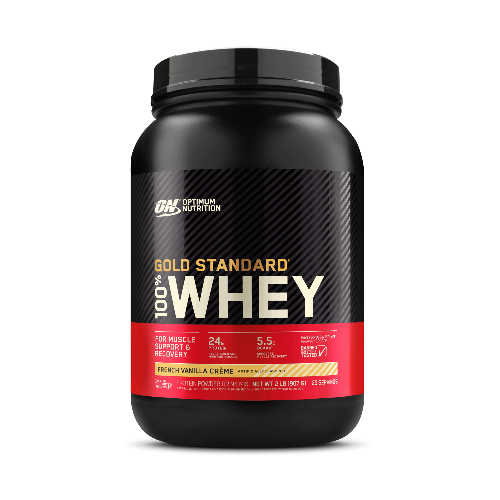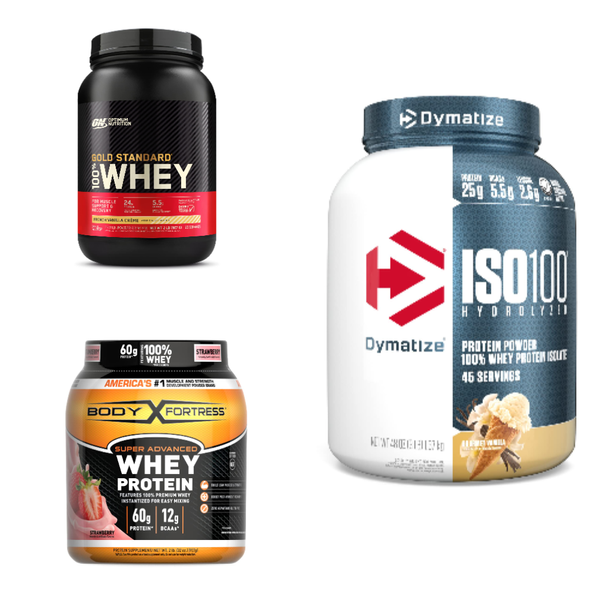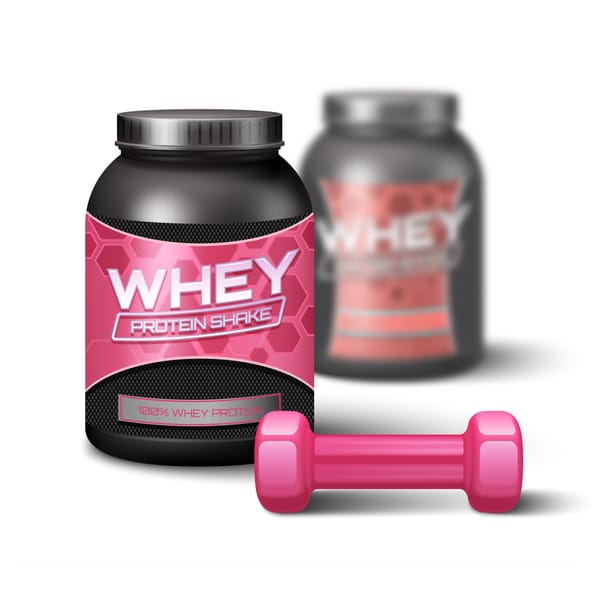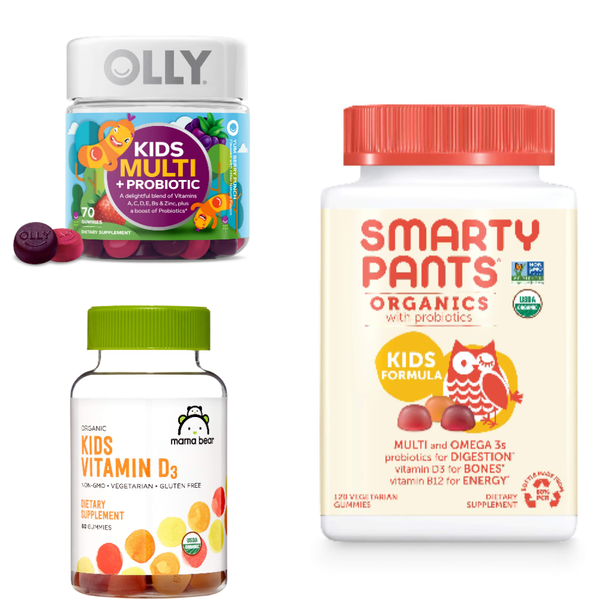Whey protein is a byproduct of cheese production and is highly regarded in the sports nutrition industry for its rich amino acid profile and quick digestion. It's a staple in many fitness enthusiasts' diets, aiding in muscle recovery and meeting daily protein intake requirements. Whey proteins come in various forms, with whey protein concentrate and whey protein isolate being the most popular. The former contains low levels of fat and carbohydrates, while the latter is further processed to remove all fat and lactose, making it a lactose-free option.
The Optimum Nutrition Gold Standard
Optimum Nutrition's Gold Standard Whey Protein is a frontrunner in the market, known for its high protein content and quality. The protein blend is a mix of whey protein isolate, whey protein concentrate, and whey peptides, designed to support muscle building and recovery. This blend ensures that the body receives a balanced spectrum of amino acids necessary for muscle repair and growth.
What's in a Scoop?
Each serving of Gold Standard Whey Protein, or one rounded scoop, is packed with muscle-building nutrients. It typically contains about 24 grams of protein, which is a substantial amount to meet the daily protein requirements for most individuals. The low fat and carbohydrate content makes it an ideal choice for those watching their calorie intake while trying to build or maintain muscle mass.
Flavor and Mixability: A Taste Test
The whey protein powder from Optimum Nutrition is known for its great taste and easy mixability. Whether you choose the Double Rich Chocolate flavor or the Extreme Milk Chocolate, you're likely to find that it satisfies your sweet tooth without compromising your fitness goals. It mixes well with both water and milk in a shaker cup, leaving no clumps, which is a testament to its quality.
The Role of Amino Acids and Digestive Enzymes
Amino acids, including BCAAs (branched-chain amino acids), are crucial for muscle recovery and growth. Optimum Nutrition's whey includes a substantial amount of these amino acids, making it effective for post-workout recovery. Additionally, some formulations contain digestive enzymes that aid in the digestion of protein, which can be particularly beneficial for those with sensitive stomachs.
Beyond Protein: Additional Nutrients
While protein is the star in these supplements, Optimum Nutrition also includes other beneficial ingredients like conjugated linoleic acid, glutamine, and sometimes even digestive enzymes to aid absorption. These additions can enhance the overall effectiveness of the protein shake, contributing to better muscle recovery and overall health.
Low in Unwanted Extras
For those concerned about artificial sweeteners and flavors, it's important to note that while Gold Standard Whey Protein does contain acesulfame potassium and some natural and artificial flavors, it remains a low-fat, gluten-free option. Including these ingredients often helps improve the taste, making the protein powder more enjoyable to consume regularly.
Whey Protein Blends vs. Isolates: What's the Difference?
When diving into the world of whey protein, you'll often encounter two main types: concentrates and isolates. Concentrates are the less processed form, typically containing lower protein content (around 70-80%) and higher levels of fats and carbohydrates. They are often praised for retaining more of the natural nutrients found in whey. On the other hand, isolates undergo additional processing to remove most of the fat and lactose, boasting a higher protein content (usually above 90%). This makes isolates a gold standard whey choice for those looking to minimize calorie intake while maximizing protein consumption.
Isolates are particularly beneficial for individuals with lactose intolerance, as the extra processing significantly reduces the lactose content, making it a lactose-free option. However, some argue that the additional processing may strip away some beneficial nutrients. When considering a whey protein review, it's essential to weigh the benefits of each type. Bodybuilders might lean towards isolates for their purity and protein density, while those seeking a more balanced nutrient profile might prefer concentrates.
The Impact of Gluten-Free and Lactose-Free Options
When it comes to dietary restrictions, finding a protein powder that aligns with your needs can be a challenge. Optimum Nutrition steps up to the plate with its gluten-free and lactose-free options, ensuring that even those with sensitivities can enjoy the benefits of their gold-standard whey protein. This inclusivity is a game-changer for many, as it opens the door to muscle-building and recovery without the digestive discomfort that can come from gluten or lactose.
Moreover, the availability of these options means that individuals with celiac disease or lactose intolerance no longer have to compromise on their fitness goals. They can confidently incorporate Optimum Nutrition's whey protein into their diets, knowing that it won't trigger any adverse reactions. This peace of mind is invaluable, as it allows users to focus on their performance and results, rather than worrying about potential digestive issues.
How Does Gold Standard Whey Stand Against Plant-Based Proteins?
When discussing the gold standard whey, it's essential to consider its position in the broader spectrum of protein supplements, particularly against the rising popularity of plant-based proteins. Whey protein, derived from milk, is renowned for its high biological value and complete amino acid profile, making it a go-to choice for many fitness enthusiasts. However, plant-based proteins are gaining traction, especially among those who follow vegetarian or vegan lifestyles. They offer an alternative that's often perceived as more sustainable and ethical, though typically they need to be combined to provide all essential amino acids.
The debate between gold-standard whey and plant-based proteins isn't just about nutrition; it's also about digestibility and personal dietary choices. While whey protein is celebrated for its rapid absorption and muscle synthesis benefits, plant-based proteins are often easier on the stomach for those who are lactose intolerant or have dairy sensitivities. This is where lactose-free and gluten-free options come into play, offering a middle ground for those who want the benefits of whey without digestive discomfort. As the market evolves, we're seeing more of these specialized products catering to a diverse range of dietary needs and preferences.
Whey Protein Concentration Levels: Understanding the Purity
When we talk about whey protein, the term 'concentration' often pops up. But what does it mean? In essence, it's all about the purity of the protein. Gold standard whey products typically boast a higher concentration, meaning they contain more protein and less stuff you don't want, like fats and carbohydrates. This makes them a top pick for fitness enthusiasts who are serious about their protein intake.
Now, let's break it down a bit further. A higher concentration of whey protein means your body is getting more of the essential amino acids it needs for muscle repair and growth. It's not just about quantity, though. The quality of the protein is paramount, and with gold-standard whey, you're getting a premium source that's been processed to remove the excess lactose, making it a suitable option for those with lactose sensitivities.
The Intersection of Whey Protein and Digestive Health
Digestive health is a hot topic these days, and for good reason. What we consume can significantly impact our gut health and overall well-being. Whey protein, especially lactose-free and gluten-free options, can be a game-changer for those with dietary restrictions. By choosing a gold-standard whey that's free from these common irritants, you're giving your digestive system a break without skimping on the protein perks.
But it's not just about avoiding discomfort. Good digestive health is also about absorption. When you consume a high-quality, easily digestible protein like gold-standard whey, your body can more efficiently absorb the nutrients. This means you're not just eating smarter; you're also maximizing the benefits of every scoop. Whether you're looking to build muscle, lose weight, or simply maintain a healthy diet, paying attention to your digestive health is key.
Customizing Your Protein Intake: Tailoring Whey to Your Digestive Needs
For individuals with specific digestive concerns, the customization of protein supplements is a game-changer. The introduction of lactose-free and gluten-free whey protein options has made it possible for even those with sensitivities to enjoy the benefits of a high-quality protein source. These specialized formulas often incorporate digestive enzymes, which can significantly enhance protein absorption and reduce potential gastrointestinal distress. This means that individuals who previously had to avoid whey protein due to lactose intolerance now have the opportunity to incorporate this valuable nutrient into their diets without fear of discomfort.
Moreover, the presence of digestive enzymes in these formulations can be a boon for anyone looking to maximize their protein utilization. Enzymes like protease, lactase, and amylase work synergistically to break down protein, lactose, and starches, respectively, facilitating a smoother digestive process. This not only improves overall gut health but also ensures that the body can efficiently use the ingested protein for muscle repair and growth. By choosing a lactose-free, gluten-free whey protein enriched with digestive enzymes, consumers can tailor their protein intake to their body's needs, optimizing their nutrition and workout recovery.
Digestive Enzymes: Enhancing Protein Absorption
Digestive enzymes play a crucial role in breaking down nutrients, and Optimum Nutrition recognizes their importance by including them in their whey protein formulations. These enzymes facilitate the digestion of protein, making it easier for the body to absorb and utilize the amino acids essential for muscle repair and growth. It's a thoughtful addition that can significantly benefit users by optimizing the nutritional value they get from each scoop.
The inclusion of digestive enzymes is particularly beneficial for those who may experience digestive stress from high-protein diets. By aiding in the breakdown and assimilation of protein, these enzymes help to prevent feelings of bloating or discomfort that can sometimes accompany protein supplementation. It's a clear indication that Optimum Nutrition is dedicated to providing high-quality protein and ensuring that it's as beneficial and comfortable to consume as possible.
The Synergy of Whey with Other Supplements
In the realm of bodybuilding and fitness, whey protein often doesn't work alone. It's commonly stacked with other supplements like casein, creatine, and various vitamins to enhance overall performance and results. Casein is another milk-derived protein that digests slowly, making it ideal for providing a steady stream of amino acids over a longer period, often recommended before bed. Creatine, on the other hand, is a powerhouse for increasing strength and muscle mass, making it a staple in many athletes' regimens.
Combining these supplements can create a synergistic effect that supports muscle growth, recovery, and overall health. For instance, taking whey protein post-workout can rapidly kickstart recovery, while casein can sustain the process throughout the night. Adding creatine can further augment strength and muscle gains. Moreover, incorporating vitamins ensures that the body's metabolism and the digestive system function optimally, aiding in the efficient utilization of these supplements. Always look for gluten-free options if you have dietary restrictions, to ensure your supplement stack is safe and effective for your needs.
Lactose-Free Options for the Sensitive Stomach
Lactose intolerance can be a significant concern for many, but Optimum Nutrition has addressed this by offering whey protein isolate-based powders that are virtually lactose-free. This allows individuals with lactose intolerance to enjoy the benefits of whey protein without the discomfort that can come from lactose-containing products.
Calorie Control for Weight Management
Managing calorie intake is crucial for those looking to lose weight or maintain a lean physique. Optimum Nutrition's whey protein powders are designed to be low in calories while still providing a high protein content, making them an excellent choice for calorie-conscious consumers.
The Versatility of Whey Protein Powders
Whey protein powders are not just for shakes; they can be mixed into a variety of foods like oatmeal, pancakes, and smoothies. This versatility makes it easier to incorporate into a balanced diet, ensuring that protein requirements are met without monotony.
The Importance of Protein in Muscle Building
Protein is the building block of muscle, and adequate protein intake is essential for muscle building and repair. Optimum Nutrition's whey protein provides a quick and convenient source of high-quality protein that can support muscle growth when combined with resistance training.
Recovery and Beyond: The Bigger Picture
Muscle recovery is just one aspect of what whey protein can support. It also plays a role in maintaining overall health, supporting immune function, and potentially aiding in weight management. Optimum Nutrition's whey protein can be a valuable addition to a well-rounded fitness and nutrition plan.
The Sweet Spot: Balancing Taste and Health
Finding a protein powder that tastes great without being loaded with sugar and calories can be challenging. Optimum Nutrition strikes a balance with flavors that cater to a sweet tooth while keeping health and fitness goals in mind.
The Bottom Line on Quality and Effectiveness
When it comes to quality and effectiveness, Optimum Nutrition's whey protein stands out. It's a product that has been rigorously tested and trusted by athletes and bodybuilders alike, making it a reliable choice for those serious about their protein supplements.

Is Optimum Nutrition whey protein good for muscle building?
Yes, Optimum Nutrition whey protein is excellent for muscle building. It contains a high-quality protein blend that provides essential amino acids necessary for muscle growth and repair.
Can I use Optimum Nutrition whey protein if I'm lactose intolerant?
Yes, Optimum Nutrition offers whey protein isolate options that are virtually lactose-free, making them suitable for individuals with lactose intolerance.
How does Optimum Nutrition whey protein taste?
Optimum Nutrition whey protein is known for its great taste, with flavors like Double Rich Chocolate and Extreme Milk Chocolate that satisfy the sweet tooth while supporting fitness goals. It mixes well with both water and milk, providing a smooth and enjoyable drink.

Optimum Nutrition's Gold Standard Whey Protein is a high-quality protein supplement that supports muscle building, recovery, and overall health. With a blend of whey protein isolate, concentrate, and peptides, it caters to various dietary needs and preferences. The range of flavors, including Double Rich Chocolate and Extreme Milk Chocolate, ensures that there's an option for everyone. The inclusion of amino acids and digestive enzymes enhances its effectiveness, and its low-calorie and low-fat profile makes it suitable for those managing their weight. Whether mixed with water or milk, in a shaker cup or incorporated into meals, Optimum Nutrition's gold standard 100 whey protein is a versatile and beneficial addition to any fitness regimen.








